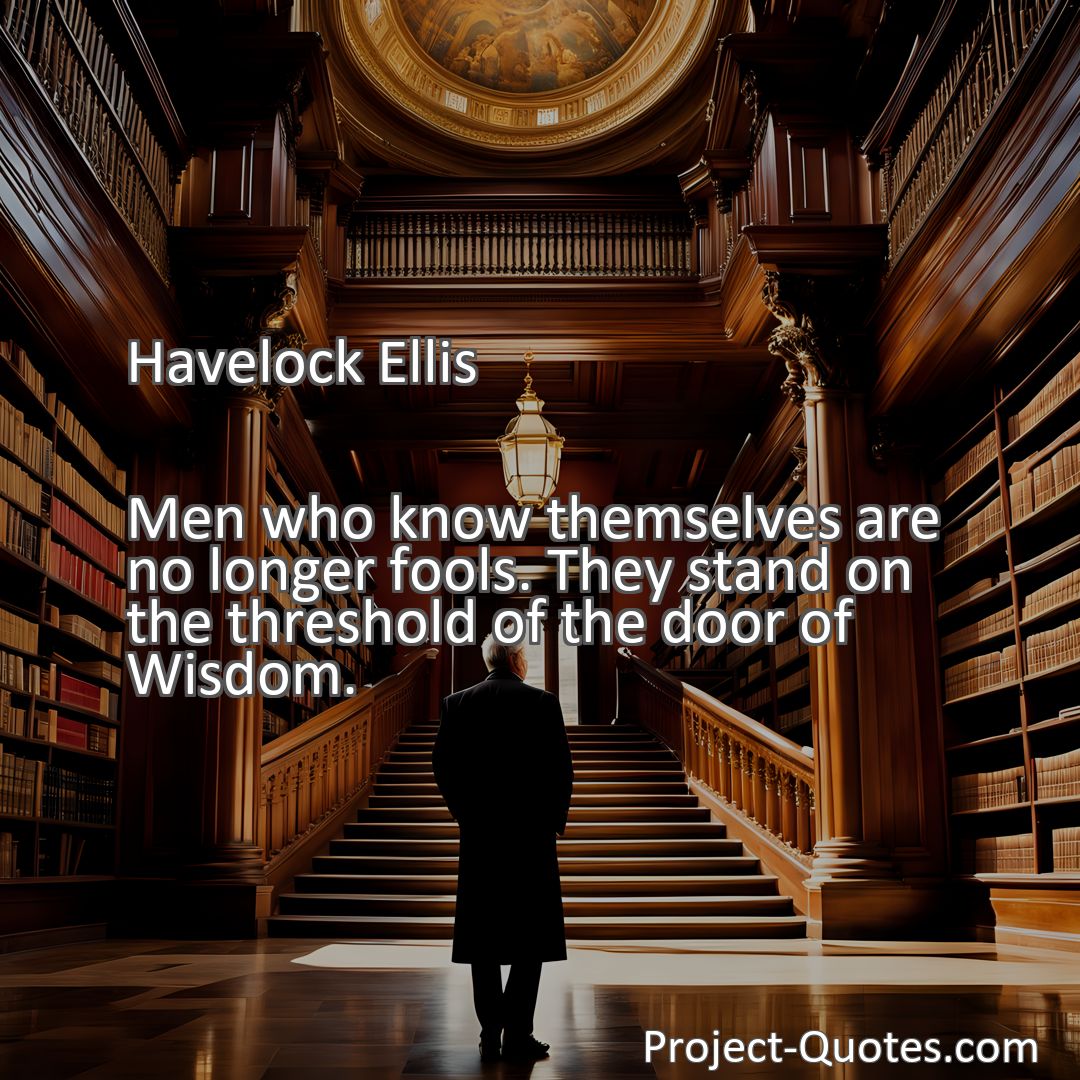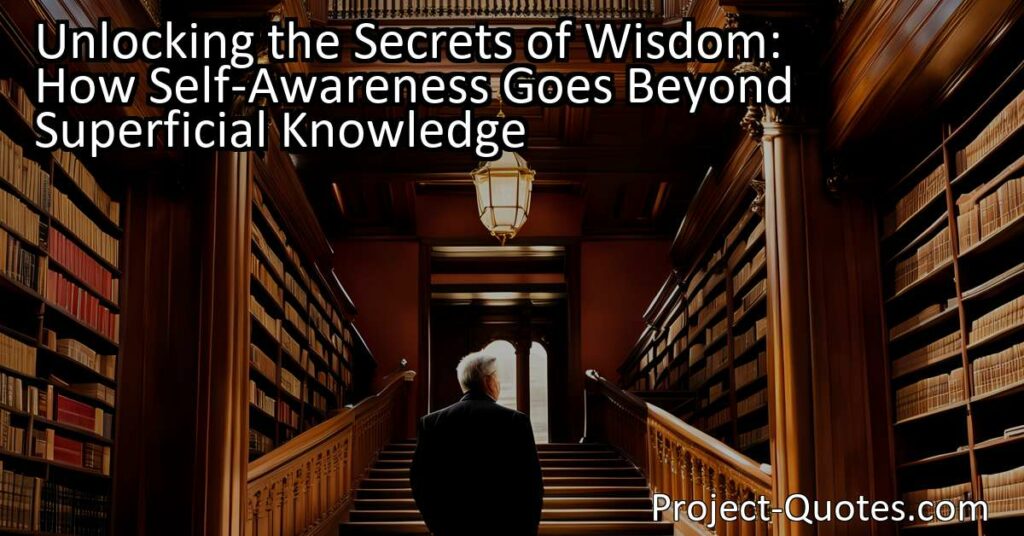Men who know themselves are no longer fools. They stand on the threshold of the door of Wisdom.
Havelock Ellis
Unlocking the Secrets of Wisdom: How Self-Awareness Goes Beyond Superficial Knowledge delves into the significance of truly knowing oneself. Self-awareness involves understanding our values, strengths, weaknesses, and how they impact our thoughts and actions. It is a lifelong journey of introspection and reflection that leads to personal growth and wisdom.
Table of Contents
Meaning of Quote – Men who know themselves are no longer fools. They stand on the threshold of the door of Wisdom.
Have you ever wondered what it means to truly know oneself? According to Havelock Ellis, a renowned author and social reformer, those who possess self-awareness are far from being foolish. In fact, they are on the verge of unlocking the secrets of wisdom, standing at the threshold of a door that leads to personal growth and enlightenment. In this article, we will delve deeper into the meaning behind this thought-provoking quote and explore the significance of self-discovery in one’s journey towards wisdom.
To begin, let us unravel the idea of knowing oneself. What does it mean to truly understand who we are? Self-awareness goes beyond superficial knowledge of our likes and dislikes; it involves a profound comprehension of our values, strengths, weaknesses, and the influence they have on our thoughts, emotions, and actions. It is about being conscious of our beliefs and perceptions, understanding the reasons behind our choices, and acknowledging our true identity.
Indeed, self-discovery is a lifelong journey, and it often requires a certain level of introspection and reflection. It is through this process that we gain insight into our own motivations, desires, and fears. By examining our thoughts and emotions, we can better understand what drives us and how we can navigate the challenges we encounter.
However, it is important to note that self-awareness is not an end in itself; rather, it paves the way for personal growth and development. When we have a clear understanding of ourselves, we are better equipped to make informed decisions and pursue goals that align with our true nature. This self-knowledge acts as our compass, guiding us towards a life of fulfillment and purpose.
Moreover, Ellis suggests that wisdom is an attainable destination for those who possess self-awareness. But what exactly is wisdom? Wisdom is not merely knowledge; it is the ability to apply knowledge and insight to live a meaningful life. It is the result of integrating our understanding of oneself and the world around us.
Wisdom allows us to make sound judgments, empathize with others, and cultivate inner peace. While knowledge can be acquired through education and experience, wisdom is an amalgamation of knowledge, self-reflection, humility, and compassion. It is a virtue that is often associated with individuals who have gained a deep understanding of themselves and others.
So, how does one go about attaining self-awareness and, ultimately, wisdom? There is no single path to self-discovery. It is a unique journey that varies from person to person. However, there are several practices and techniques that can help us embark on this transformative voyage.
One way to gain self-awareness is through introspection. This involves setting aside time for quiet reflection, away from the distractions of daily life. By engaging in self-reflection, we can examine our thoughts, feelings, and experiences, allowing us to gain a deeper understanding of ourselves.
Another practice that can aid in self-discovery is journaling. Writing down our thoughts, emotions, and experiences can help us uncover patterns, identify recurring themes, and gain insights into our own psyche. Journaling serves as a tool for self-reflection and self-expression, allowing us to explore our innermost thoughts and feelings.
Additionally, seeking feedback from trusted friends, family members, or mentors can provide us with valuable insights about ourselves. Sometimes, others may see aspects of our character that we are blind to and can offer constructive advice on personal growth. This external perspective can be eye-opening, allowing us to gain new perspectives and challenge our limited beliefs.
Furthermore, incorporating mindfulness practices into our daily routines can enhance self-awareness. Mindfulness involves being fully present in the moment and paying attention to our thoughts, emotions, and sensations without judgment. Through mindfulness, we can observe ourselves objectively, recognizing our automatic reactions and cultivating a greater sense of self-awareness.
As we journey towards self-awareness, it is essential to embrace self-acceptance and practice self-compassion. Often, we are our harshest critics, holding ourselves to unrealistic standards and berating ourselves for our shortcomings. However, self-acceptance involves acknowledging our weaknesses and embracing our imperfections. It is through self-acceptance that we can build a strong foundation for personal growth and self-improvement.
In conclusion, Havelock Ellis’s quote reminds us of the significance of self-awareness in one’s pursuit of wisdom. Understanding oneself is a transformative journey that involves introspection, self-reflection, and embracing self-acceptance. By knowing ourselves, we gain insight into our motivations, desires, and fears, allowing us to make informed decisions and pursue meaningful goals. Self-awareness is the key that unlocks the door to wisdom, guiding us towards a life of fulfillment, compassion, and inner peace. As we continue on our individual paths of self-discovery, let us remember that the journey itself is an invaluable part of our personal growth and the pursuit of wisdom.
I hope this quote inspired image brings you hope and peace. Share it with someone who needs it today!


